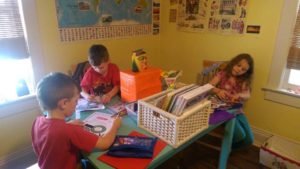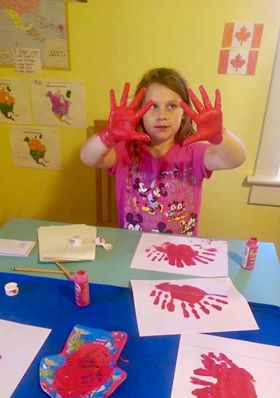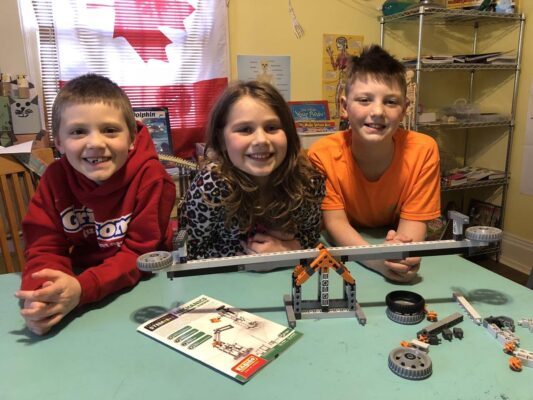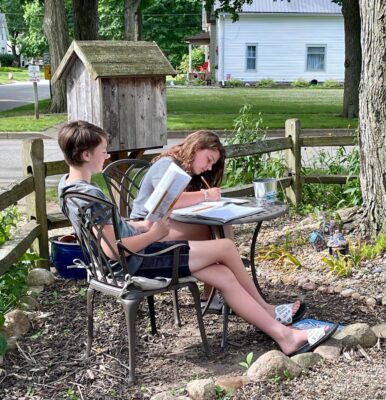Choosing Homeschool
Our Story on Choosing Homeschool
 Why our family chose to homeschool was once a question we were asked often. I think people assumed early on that we just didn’t like the public school systems, and while there are flaws there, that was only a portion of the answer.
Why our family chose to homeschool was once a question we were asked often. I think people assumed early on that we just didn’t like the public school systems, and while there are flaws there, that was only a portion of the answer.
Others thought it was a religious choice and while we are a family of faith, that didn’t hold more weight than really any of our other reasons. The truth is, choosing homeschool was choice made with several reasons.
I know many people are often on the fence about homeschooling for themselves or wonder why people choose to homeschool, so I thought I’d dive into some of the reasons why we chose to homeschool and some of the reasons others that I know, homeschool. Maybe it might help those trying to understand.
My Experience
I was raised in public school until 7th grade, that was my last full year of public school. I started school in 1984 and my elementary years were amazing, for the most part. It was a time when parents and teachers really worked together for the benefit of children. Parents were very active in PTA and teachers were very communicative to parents, sending notes home often, even calling. The teachers were almost like an extension of the family.
My early middle school years were very different and the warmth of elementary school vanished. Though middle school is a different arrangement than elementary school and this is to be expected. Middle and high school teachers teach several classes a day, often with over 20 students in each, while elementary teachers usually teach the class for the entire day, allowing them to really engage with students and see how they best learn.
It is easy to understand that with the increase of kids, why the disconnect happens in middle and high school. Parents go from having 1 teacher for their children to 6 or 7, and keeping the ties of parent and teacher becomes much harder.
I usually did well in school but I noticed that once I hit middle school, many of my classmates weren’t doing as well. Looking back, I realize that there just wasn’t enough time or the optimal teacher-student ratio to keep all of the kids at the same level, not to mention, that there was little to no acknowledgment that people learn in different ways. Another thing I noticed was the increase in bullying, not so much toward me, but in general. The bullying essentially went from 0-100% and it is especially disheartening, making the environment toxic for everyone, whether they are being bullied or not.
My 7th grade year was the last year of public school I completed. My family had no intentions of homeschooling, I know I’d never heard of it at that point, but I had a unique set of circumstances occur that year. I became a ward of the state and eventually in the care of someone who did homeschool. Due to circumstances, I did have some small portions of schooling in high school. Going into the complicated details of this part of my life would take pages of its own, and you’d eventually get glassy-eyed or want to make popcorn to read it, but at the end of it, I was introduced to homeschool.
My homeschooling years were less than stellar and again this had a lot to do with the circumstances that I was in, however, I was opened up to a new perspective. Many homeschoolers that I knew were thriving in a very classical way. Many spoke more than one language and played instruments, but I also noticed negatives. They were sheltered to the point of living in a bubble. While they could socialize, they had no need to with those outside their circles, however, this isn’t really any different than the social circles that form in public school, but in seeing both perspectives, I have always understood the many sides to the public school/homeschool debate.
Our Kids and Homeschool Decision
So, we’ll fast forward some years, to when I became pregnant with my first and I began to wonder what I would want in terms of education for my children. This was an interesting time, as my husband was not keen on the idea of homeschooling. He had many of the same ideas others had, and still have, about homeschoolers. There is a notion that homeschooled children are “odd” or “unsocialized”. We had many heated debates, for several years, about whether homeschooling could even be an option.
On a side note, this conversation probably should have been had before getting married and I would recommend having hard conversations like this, to any couple considering marriage and children, before those things happen.


When my oldest was 4 and my middle was 3, I sent the kids to a 3-day preschool, that was 2.5 hours a day. I also volunteered there to help teach and do the parties. I’ll be honest, it was preschool and I wasn’t expecting much academically, however, there was a heavy push to get these kids “normal” for kindergarten. Preschool is a great time to help children adjust to time away from parents, which will be helpful for kindergarten, but the push for conformity is what struck me.
Kids were pushed to write the same, speak the same, answer questions the same… word for word, and it was a bit alarming. A child (not my child) wrote his number 8 as two circles on top of one another verses the infinity way (this is also how I write my 8 personally), this child was pulled aside and worked with to get his number 8 right. When I inquired about this, I was told that this is the kind of thing that will have children marked as “different” and in possible need of “special assistance” once they hit kindergarten. I was a bit shocked. It was like we were in the first stage of factory farming these kids.
There were some other issues too that I don’t want to dive into during this post, but they put me on a quest to research America’s public education system.
The next year, I held my oldest with me instead of sending him to kindergarten. My hubby and I had agreed that this would be the year we would make a decision and that it wouldn’t be a detriment to have him start a year late should we choose public school. A note here… we came to this conclusion by researching children worldwide. Many studies show that children who don’t start formal education until age 7, are better adjusted for general learning.
That year, my oldest, my middle, and my youngest went to preschool, where I volunteered as before. After the Christmas break, we didn’t go back and my husband and I agreed to give homeschooling a try. This year my oldest is in 9th grade and while it has never been an easy ride, I don’t regret it in ANY way!
Why We Chose To Homeschool
The time in preschool opened my eyes to many things and pushed me to research others. I didn’t like the general conformity that was pushed onto the kids in preschool. While there needs to be a standard, conformity is something altogether different.
 After researching public education, I was alarmed by the pace at which the United States is falling behind other countries. I originally did this research over a decade ago and sadly, the rates are not any better. Today, the average 15-year-old American is lacking in science, math, and reading. The U.S. ranks 28th in science, 36th in math, and 24th in reading… those numbers are heartbreaking! (1)
After researching public education, I was alarmed by the pace at which the United States is falling behind other countries. I originally did this research over a decade ago and sadly, the rates are not any better. Today, the average 15-year-old American is lacking in science, math, and reading. The U.S. ranks 28th in science, 36th in math, and 24th in reading… those numbers are heartbreaking! (1)
One thing I read so much about during my research was test scores. Everything was about test scores and while being able to take a test is important, all education shouldn’t revolve around testing. Teaching this way creates an atmosphere of cramming and short-term memorization versus understanding and gaining knowledge. Another thing I noticed with test scores being such a priority is that many other areas were not focused on, such as music and art. This didn’t sit well with me personally.
While making the choice we looked hard at our local public school system, as they do vary from state to state and even by county. Our schools had C grades, how does an elementary school have a C grade? We also noticed at the time, that our school changed to a new Tech system that did most things using STEM. Many parents were very alarmed by the grouping of students for projects. This seemed to create a system where some worked hard while others didn’t, but everyone in the group received the same grade. While parents seemed thrilled at first because it was “sold” as such a science and tech-heavy program, it turned quickly into an imbalanced system, where individuals weren’t noticed for their achievements and those that needed support were pushed through the system, thanks to the No Child Left Behind initiative.
 I have since taken a course on STEM, or what is sometimes known as STEAM (adding Arts to Science, Technology, Engineering, and Math), and while there are fantastic principles to the idea of including all areas of learning with each other, there are many downfalls. Leadership is rarely promoted or appreciated by teachers, and in my opinion, learning leadership is important. Strengths and weaknesses of students are missed and this seems counterproductive to learning. While I use STEAM ideas in my homeschooling… I can see how applying it to students on different levels, and without the proper guidance, could be highly problematic.
I have since taken a course on STEM, or what is sometimes known as STEAM (adding Arts to Science, Technology, Engineering, and Math), and while there are fantastic principles to the idea of including all areas of learning with each other, there are many downfalls. Leadership is rarely promoted or appreciated by teachers, and in my opinion, learning leadership is important. Strengths and weaknesses of students are missed and this seems counterproductive to learning. While I use STEAM ideas in my homeschooling… I can see how applying it to students on different levels, and without the proper guidance, could be highly problematic.
While many of the reasons for this decision were academic, some were personal. A big reason was… I wanted to be with my children. I wanted to see my children’s faces light up when they learned new things or found things they loved. I wanted to have some control over when my child was introduced to certain topics, like sex. The truth is, I could write for days on why we chose to homeschool but the basics fell into these reasons…
- Independent thinking and individuality were important to us
- We were concerned by the priorities of the public school system
- The overwhelming decline in U.S. students on a global scale was concerning, even though it spends 34% more than many of the countries they lack behind(2)(3)
- We worried about the teacher/student ratio
- We were concerned with the learning environment, as bullying, money, status, and so on always seem to creep their way into the schools, not making them learning conducive
- We wanted to have some say in the curriculum that my children were learning. While many may speculate this means I wanted a Christian-based curriculum, where we abandon all science… this was not true for us. We do see our world through a lens of faith (not religion), however, this was more about focusing on an education for life versus an education for tests.
- We wanted to have some control over what the children were exposed to and WHEN they were exposed. No teacher, state, or government knows when my children are ready for certain topics. A parent knows their child best.
- We began to realize that the lengthy day of public school children was unnecessary.
- I wanted to spend more time with my children and we wanted to have the flexibility to learn as a family.
Being Qualified to Teach
In the beginning, many asked me what made me feel I was qualified to teach my children, which I always thought was funny. What makes someone qualified to be a parent in general? People don’t ask expecting parents that question… because it is absurd, and it is equally absurd to ask a homeschool parent what makes them qualified to teach their children.

What is an education? This is a question for a much larger debate but in my opinion, knowing the basics of math, science, history, geography, and English (for those who are native English speakers) is the foundation of an education. Once this foundation is met, teaching children how to learn on their own… and why that learning is important… is the goal. Almost any parent can give their children a good foundation in education.
Teachers of today are highly qualified to deal with situations that might arise when teaching large groups of children. They are taught how to deal with children who have behavioral issues, who are going through abuse, who have special learning needs, and so on… but most students don’t fall into those categories. Parents simply need to give their children a great foundation and allow their kids to follow their interests.
Obviously, if a homeschooled child is dyslexic, a parent would need to seek methods to help teach to that child’s needs or find someone who can, but even children with varying needs are finding homeschool a wonderful environment to learn in, proving that most people are qualified to teach the basics of education, even to those that have unique learning needs.

Much of the issue of being qualified I believe lies in the feeling most parents have of simply not being able to deal with or handle their children all day. I have had many parents state that they simply couldn’t “deal” with their children all day. I usually say something like… “Yeah, some days are better than others.”, which is true but also because I don’t really know how to answer that. In truth, if homeschooling is being done right, it shouldn’t need to be an all-day thing. When children are young, education time, as we call it, shouldn’t need to be more than a couple of hours and as they get older, the goal should be for them to be able to learn on their own. The ability to know how to learn and find answers for themselves is the real lesson in education… and in life.
Homeschooling might not be for every family but any family considering it shouldn’t not do it because they don’t feel qualified. You can love your children and be a parent to them, with some research and planning anyone can be qualified to teach their children the basics of an education. Then, once that foundation of education is met, you will be able to work with your child to discover their interests and talents.
After All This Time
After many years of homeschooling, I realize that the conformity within the public school system hasn’t gotten any better. The parents of my children’s friends have all commented to me over the years, how their children were overlooked, labeled, or put into some position to conform that made the child and/or the parent uncomfortable. Many of my friends’ children have changed schools due to issues within the school system and even more have had to fight the system to acknowledge their child’s unique challenges, such as ADHD, even with documentation. I also personally know a family that chose to homeschool after the school system did not acknowledge their child’s allergy to peanuts, causing several scares and a hospital visit.
After all this time, I am still happy with our decision to homeschool. It hasn’t always been easy but life isn’t easy and children need to know that so they have realistic expectations of life. There are many questions about homeschooling like socialization and curriculum that I have been asked many times, and this post is more about why we chose to homeschool not how to homeschool, but what people need to know is that being a homeschool parent is a full-time position, much like being a parent is a full-time job. There is a lot that goes into homeschooling, even for those who do unschooling (another option in homeschooling that is almost all interest-led learning and uses curriculum sparingly, if at all), there is constant thought toward life and enrichment.
Choosing Homeschool

If someone were to ask me today why I chose to homeschool, I could give them many reasons, but the main reason was and still is to simply be with my children. Choosing homeschool wasn’t always the easiest choice but I wouldn’t trade the hours of cuddling and reading together, the museum trips, the good weather days (vs having just snow days off), the afternoons learning to make cookies, the crafts, the library trips, and so much more. My children and I were able to grow a bond that has allowed me to have a special relationship with them.
While I know that many will argue against homeschooling, it has worked for my family. When I see my children in contrast to many of their peers, I can see people with character far beyond their years.
Though I try not to compare my children to others, when being retrospective, I see that educationally my children not only are on level or above their peers in most areas but they also have skills many of their peers seem to lack. I also don’t think my children, my husband, and I would have the relationship we have without homeschooling. This doesn’t mean homeschooling is the only way for a family to be close but I know it has made us a stronger family.
Choosing What is Right For Your Family
At the end of the day, I hold no judgments for parents who choose to educate their children differently than we did, regardless if that is homeschooling differently or some sort of outside-the-home education. We have to do what is right for our families. This post is a very small glimpse of the conflict we felt, the research we did, and the thought that went into our choosing to homeschool.
What I hope that comes from this post is that others will realize that there are multiple options in education and that the many who argue against ideas that are considered outside the norm, usually don’t have all of the information required to make decisions and often come from a place of emotion and misinformation.
If you are considering choosing homeschooling, I highly recommend reading this book The Well-Trained Mind: A Guide to Classical Education at Home. Susan Wise Bauer is the author and she has revised this book a few times. I don’t have the newest revision but the version I have has been very helpful for me and it is used by many homeschool families. It offers ideas for curriculum, schedules, and much more. While it got me on the journey… I did not feel compelled to use all of the suggestions but this book is a BIG resource to have!
Some don’t like the book above because the author comes from a Christian perspective but many of the suggestions are not Christian based. I would say that this book and her suggestions are not entirely based in religion or secularism. There are too many points and suggestions for most to not find something to cover their needs and the book is a great way to dive deeper into the topic of homeschooling in general.
You Don’t Have to Explain
At the end of the day, homeschooling is a personal choice based on what is best for your family and you don’t owe others an explanation. Honestly, I don’t know if any homeschooling family could totally explain why they chose or are choosing homeschool, and there is rarely just one reason.
For those who know your reasons and are still asking “How do I homeschool”, I would recommend again the book I mentioned above The Well-Trained Mind: A Guide to Classical Education at Home but I also plan on writing a post, or series of posts, on how to homeschool. There is no one way to homeschool but I would like to share what we did and maybe what we would have done differently. Until then, check out some of my general homeschool posts!
I would love to hear your thoughts! Do you homeschool? Are you considering choosing homeschooling? Have you been met with questions? Share your thoughts and questions!
Comment below or head over to Instagram or Facebook and share your homeschool pics… tag me @bemandfam… or if you want to read this or reference it later, either book mark it or pin it for later. (If you like Pinterest, I am there too!)
Thanks for reading a little of our journey and I wish you the best on yours!
BEM and Fam

PS. This post has some affiliate links, read more about those here.





